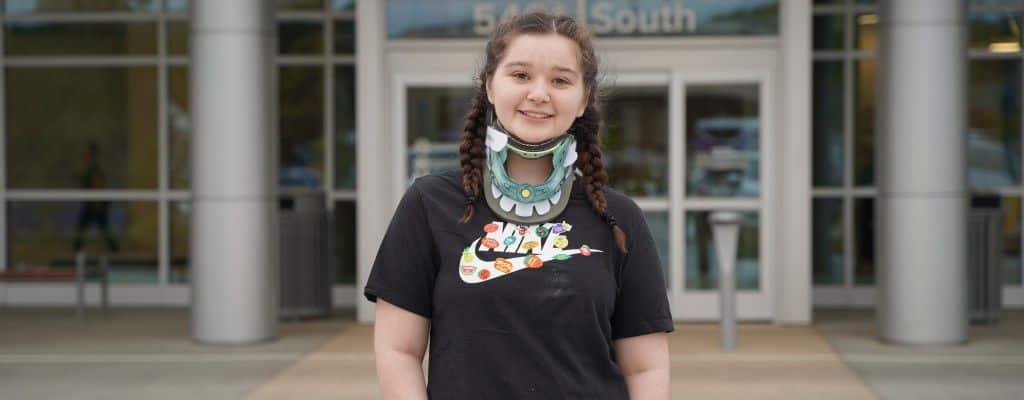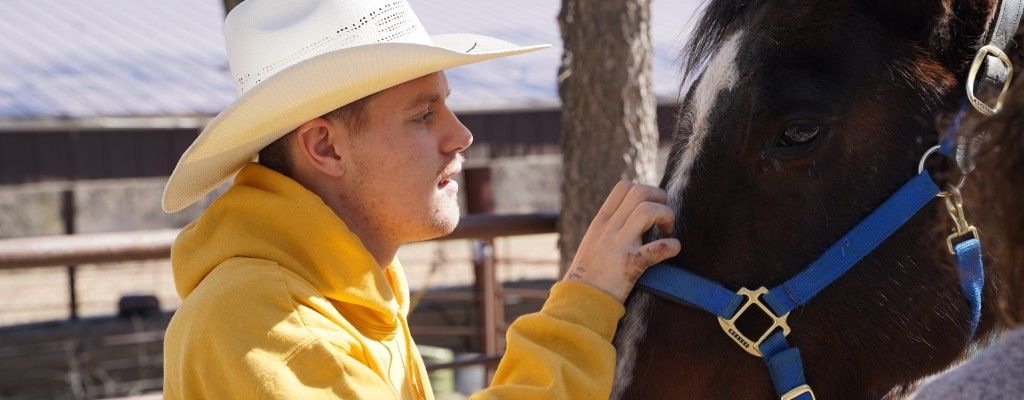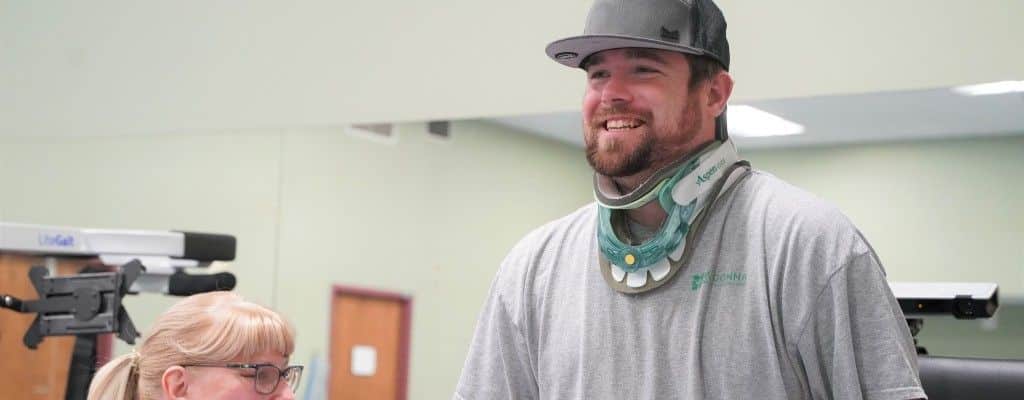SPINAL CORDSpinal Cord Injury
Helping patients return to their life roles regardless of their level of injury.

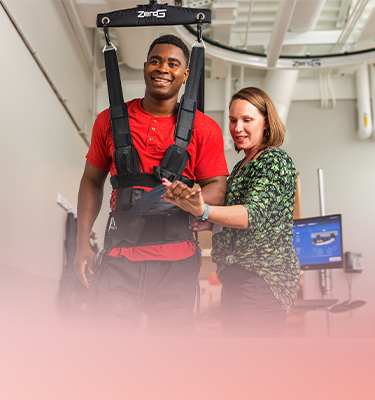
0
0
0
0
Program Overview & Details
As a national destination for spinal cord injury rehabilitation, we aim to maximize independence and resolve barriers of returning to homes and communities by establishing a unique treatment for each patient.
Unique Program Features
Technology, expertise and a commitment to teaching are among the features that make Madonna’s spinal cord injury program unique and effective, regardless of the level of injury.
Family Involvement
Family members are encouraged to participate in therapy sessions whenever possible. Madonna team members are committed to educating patients and their families so they feel confident in care moving forward.
Specialized Technology
Our technology helps with the repetition and simulation of real-world activities, as well as providing adaptations for returning to work and recreational activities after a spinal cord injury
Program Medical Director
Paul Krabbenhoft, MD, Physiatrist and Spinal Cord Injury Program Medical Director, maintains the closest connection possible with spinal cord patients to help them achieve their best possible outcomes.
A Typical Day at Madonna
Our intensive and highly individualized therapy program helps spinal cord injury patients regain their maximum level of independence all in our highly caring culture throughout their journey.
Patient Stories
Patients and families from across the nation travel to Madonna for our exceptional care, a renewed sense of hope, and a new path forward.
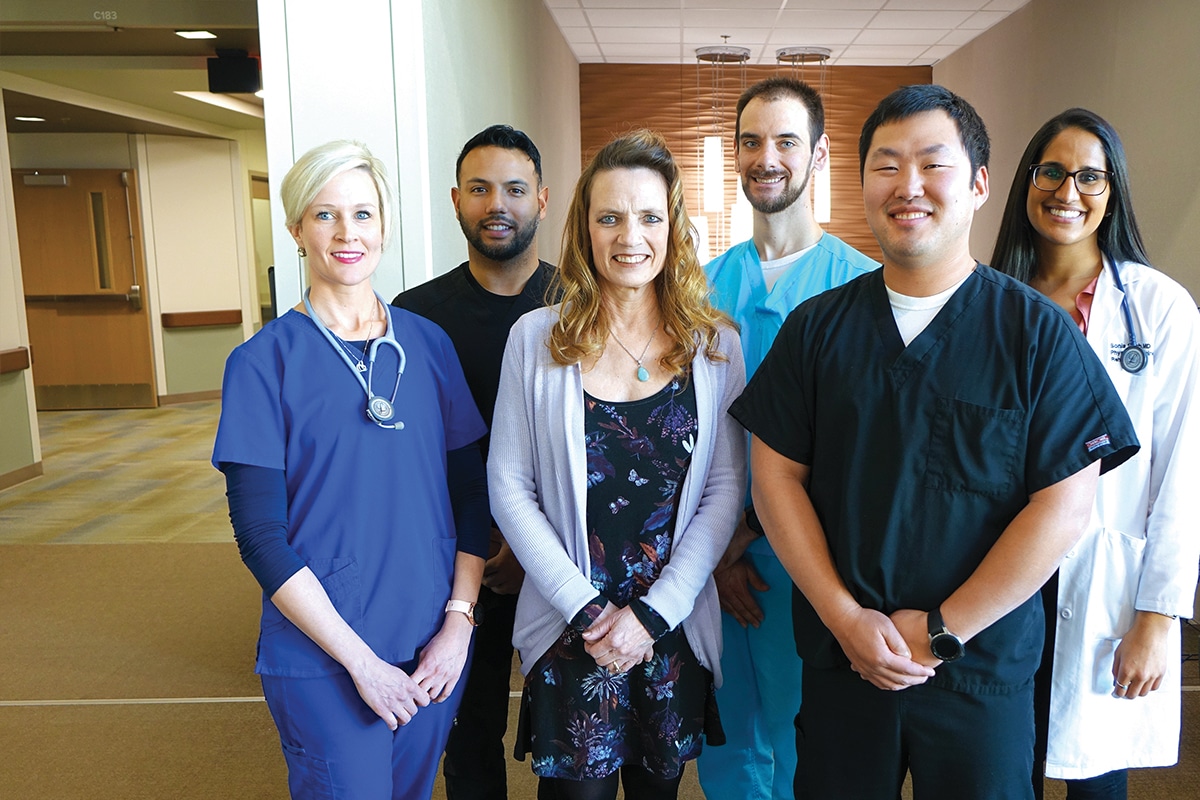
An Interdisciplinary Team Will Guide the Recovery Process
Madonna’s holistic approach to care involves deeply caring professionals across many disciplines. From physiatrists to physical therapists. From neuropsychologists to speech-language pathologists. Social and spiritual care. Nutrition and education specialists. All working together to help you regain your fullest level of independence. All while developing a close, meaningful relationship with you throughout your journey.
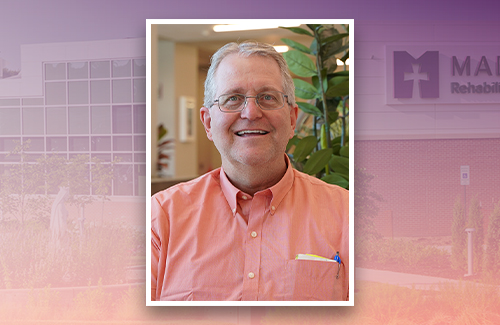
Overseen by our Program Medical Director, Board-Certified in the subspecialty of Spinal Injury Medicine
Dr. Paul Krabbenhoft, MD, physiatrist and spinal cord injury program medical director, maintains the closest connection possible with each spinal cord patient to help them achieve their best possible outcomes.
Dr. Krabbenhoft completed his medical residency at the University of Minnesota and is board-certified in physical medicine and rehabilitation. He’s a member of the American Medical Association and the National Spinal Cord Injury Association.

Awards & Accreditations
We gain recognition by acknowledging each patient’s unique needs. We are always pioneering and researching new technologies to serve specialized purposes, investing in exceptional medical talent, and developing progressive treatments to change the face of rehabilitation. Everything we do is dedicated to helping you live your most independent life.
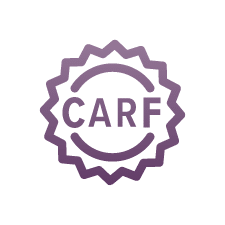
CARF Accreditation
Madonna has received the highest possible level of accreditation from the Commission on Accreditation of Rehabilitation Facilities (CARF) across 14 inpatient/outpatient categories. This year, Madonna celebrates 46 years of continuous CARF accreditation.
Pediatric Spinal Cord Injury Accreditation
Madonna is one of only three CARF-accredited spinal cord injury specialty inpatient and outpatient programs in the United States.

Additional Resources
Glossary of Terms
Learn the most commonly used terms in spinal cord injury rehabilitation here.
Family Housing
Need a place to stay while your loved one recovers? We provide comfortable and convenient housing options so you can stay connected and supportive throughout the recovery process. Explore our amenities today.
ThinkFirst
Madonna has been a ThinkFirst Chapter since August 2010, creating injury prevention awareness in the community. We are committed to promoting safety and our clinicians offer expertise at thousands of community events each year to reduce the risk of serious injury.
Continence
Madonna’s Continence Specialty Program helps patients who, because of an illness or serious injury, experience bowel and bladder dysfunction symptoms regain control and return to their life roles.
Resources
The amount of information available about spinal cord injuries can be overwhelming. Madonna coordinates with local, regional and national organizations to help patients find the most helpful online resources.
View Spinal Cord Injury resources here.
Support Groups
You don’t have to go through the rehabilitation journey alone. We offer a variety of support groups, with virtual and in-person options available.
- Lincoln Campus
- Spinal Cord Injury Support Group
- First Tuesday of each month 4:00 p.m.-5:00 p.m.
- Contact Diane Ulmer at [email protected] for location or Zoom link
- Spinal Cord Injury Support Group
- Omaha Campus
- Spinal Cord Injury Support Group
- First Tuesday of each month 4:00 p.m.-5:00 p.m.
- Contact Tyler Pribnow at [email protected] for location or Zoom link
- Adolescent/Young Adult Spinal Cord Injury Support Group
- Third Tuesday of the month from 6-7 p.m.
- Contact Angela Holliday-Okumu at [email protected] for location or Zoom link
- Spinal Cord Injury Support Group
Scope of Services
The goal of Madonna’s Spinal Cord Injury Rehabilitation Program is to help the individuals we serve become as independent as possible regardless of their level of injury. Madonna strives to establish a lifelong relationship with each patient and his/her family. Programming is highly individualized, dependent upon each person’s needs and personal goals. Family members and identified care support persons are encouraged to be actively involved in therapy and nursing care so they may reinforce learning new skills to facilitate a smooth transition back to home, community, transitional living or an environment that best supports the patients long term care needs.
Madonna admits patients from multiple trauma systems, acute care hospitals and long term acute care hospitals locally and from the region. Each patient is assessed prior to admission for appropriate medical stability and acuity according to the level of care required. We serve patients with spinal cord injury across the continuum of care including our long-term acute care hospital, acute rehabilitation, rehab day program, outpatient services, follow up clinic, and comprehensive assessment. Outpatients are referred to our services from inpatient rehabilitation programs and a variety of community physician specialties. A referral from a physician is required to access Madonna’s continuum of care. The program also offers SCI Support Group both in person and virtually.
Madonna’s Spinal Cord Injury Rehabilitation Program serves children 0-18 and adults of all ages with any level of complete or incomplete neurological impairment because of traumatic or non-traumatic spinal cord injury (SCI). The CARF accredited SCI program is housed at the Lincoln campus for adults and the Omaha campus for children 0-18 and serves patients with spinal cord injury with any impairment, activity limitation or participation restriction they face as a result of their injury. At the Omaha campus, our adult rehab program focuses primarily on non-traumatic injuries and spinal cord dysfunction with some exceptions made for medically necessary reasons. Within our various levels of care, behavioral and psychological status needs to be sufficiently stable in order that the individual can participate in the program of care but resources are available including rehabilitation psychology, spiritual care and social work to work with the patient and family if there are concerns. The program is inclusive of all cultural needs and individualizes care based on preferences and cultural accommodations.
An interdisciplinary team of clinicians address a multitude of functional areas, including activities of daily living (ADL), assistive technology, behavior management, cognition (thinking and reasoning skills), communication, community integration, driving, durable medical equipment, environmental modifications, leisure and recreation, mobility, orthotics and prosthetics, wheelchair seating systems and vocational rehabilitation.
Patient-family education is provided on a wide variety of topics both one-on-one and in a group classroom setting. Education classes address emergency preparedness, management of personal care assistants, aging with disability, prevention of potential risks and secondary health complications from SCI, life-care planning, self-advocacy and community resources. Education and interventions are provided for mobility and use of orthotics/prosthetics. Education is also available to the community and other professionals and provided through webinars, prevention education events, continuing education events and mentoring.
The program is comprehensive, providing medical interventions and assessment in the areas of co-morbidities, neurological changes, abnormal tone, body composition, autonomic dysfunction, bladder and bowel function, circulation, swallowing and nutrition, infection, medication management, musculoskeletal and neurological effects, pain, respiration including ventilator and/or tracheostomy management, sexual function/fertility, skin care and spasticity management. Patients with a need for chemical use/abuse/dependency treatment are referred for treatment outside Madonna. The program is also comprehensive in its research capability through Madonna’s own research institute in addition to educating patients on opportunities to participate in research outside of Madonna.
Health promotion and life-long wellness training — including having a plan to stay active and to exercise safely — is also important for individuals completing their rehabilitation. Our trained staff promotes success by addressing women’s and men’s health issues and training in use of equipment to in a community-based fitness environment. In addition, they explore new wellness opportunities that match a patient’s current fitness level and develop a plan to move forward with them after discharge. Spinal Cord Injury impacts individuals life long and therefore addressing the transitions across the lifespan is a key part of training the individuals and their support system to anticipate and meet the needs to stay well in the future.
Clinical Expertise: Each patient’s care is provided directly by a physician who specializes in physiatry and/or a physician who specializes in internal medicine. A pediatrician is also involved in the daily care for individuals 18 years or younger. Other physician specialists, such as pulmonologists and urologists also provide onsight consultation services at Madonna. Madonna nurses are trained to care for patients with spinal cord injury, and many are also Certified Rehabilitation Registered Nurses. The spinal cord team has a rehab counselor who provides direct care and facilitates the team approach to adjustment to the disability, behavior health, and peer support services. The psychology staff provides family and support system counseling both individually and in a support group setting and provides support in the area of sexual adjustment. Case management is also a key part of the program in preparing patients and families for transitions across the lifespan, resource management, and how the importance of lifelong follow up with key health care providers.
Treatment Equipment: Madonna has a multitude of options to maximize patient recovery and outcomes. Equipment such as the RT-300, body weight support treadmill, Lokomat and the EKSO may be utilized for individuals with incomplete spinal cord injury as they work to regain motor strength and control. Equipment options are also available to serve pediatric individuals as well as individuals who may need bariatric accommodations. Our research capability and rehab engineering staff extends our scope into development of new equipment and technology patients with SCI can benefit from now and in the future as well.
Madonna utilizes assistive technology that provides individuals with any level of injury the opportunity to be more independent with phone and computer access as well as environmental control. Examples include voice-activated phones; voice-activated computer software; eye-gaze software; and environmental control systems using sip/puff or other switches.
Wheelchair Seating and Positioning: Selecting a wheelchair and following up after getting a new wheelchair are important to the overall long-term success of an individual with spinal cord injury. Pressure injuries are a common and very costly secondary complication in persons with SCI. An adequate seating system is one way to prevent this complication. Madonna features an electronic pressure-mapping system that visually indicates pressure points, allowing clinicians to design and provide an appropriate seating system.
Preparation for Home: Madonna patients with spinal cord injury are provided with a 24-hour, caregiver-training program based on principles of self-advocacy and self-direction. We teach individuals, with or without identified caregivers, how to direct their care and what to do if emergencies arise. The program addresses environmental modifications and provides opportunities for training in safety in the environments in which they participate both at home and the community. The program utilized a transitional living experience to prepare patients for community integration and independent living. The teams also use regular community outings and home and work assessments to prepare patients for a transition back to the community. The program makes recommendations for home modifications in partnership between our home assessment specialists, the team and the patient and family.
Community Reintegration: Rehabilitation does not stop when the patient gains basic skills of self-care and mobility. Madonna integrates a variety of independent living skills into the program including adaptive sports and recreational outings. Patients may also visit with a vocational rehabilitation or AgrAbility counselor about work re-entry, and may work on specific goals related to their return to driving or school.
Virtual Services: Spinal Cord Injury follow up clinic and comprehensive assessment can be provided virtually for those patients who are residents of Nebraska, Kansas and Missouri. Nebraska residents can also utilize virtual services for outpatient Occupational, Physical, Speech therapy as well as continence specialty services. While patients are inpatient they can utilize telehealth services for psychiatric consults at the Omaha campus and infectious disease consults at the Lincoln campus. SCI Support Group is also offered virtually one time a month.
Fees of Service: Cost of care is determined by diagnosis, level of care, acuity of care and length of stay. For more information on fees of service please see: https://www.madonna.org/admissions Madonna accepts patients with a wide variety of funding, including Medicare, Nebraska Medicaid, commercial insurances such as Blue Cross and Blue Shield, worker’s compensation, and will consider out-of-state Medicaid and non-funded patients on a case-by-case basis.
Days, hours of service, settings: Patients receive assigned hours of therapy appropriate for their level of care and function Monday-Friday. Nursing and physician services provided within the scope of the spinal cord program are provided 24 hours a day, seven days a week on an inpatient basis at the Lincoln and Omaha Hospital Campuses. Saturday and Sunday therapies provided on an as needed basis for inpatient therapies. Outpatient services are provided Monday-Friday with the exception of some holidays. Outpatient frequency is determined following evaluation of the patient and in collaboration with the patient to meet his/her goals and preferences. Outpatient services are provided at the Lincoln and Omaha campuses Monday-Thursday 7:30am-6pm and Friday 7:30am-5:30pm. Services for patients both served in the hospitals and those in the rehab day program may also be provided in community settings during therapeutic outings.
Long Term Follow Up and Comprehensive Assessment: A spinal cord injury affects a patient lifelong. Madonna offers an opportunity for persons who have previously received services or who are new to Madonna to return to participate in a follow up clinic or comprehensive assessment to determine if there are any further needs as they age or transition to new roles since injury. The program also aims to assist in prevention of secondary complications with a comprehensive look at function, equipment and risk factors. Individuals complete a telephone screen, then, based upon the information collected, he/she may be scheduled for a comprehensive assessment, which is customized to their specific needs and includes a physiatrist as well as other clinicians who specialize in the assessment and treatment of persons with spinal cord injury.





